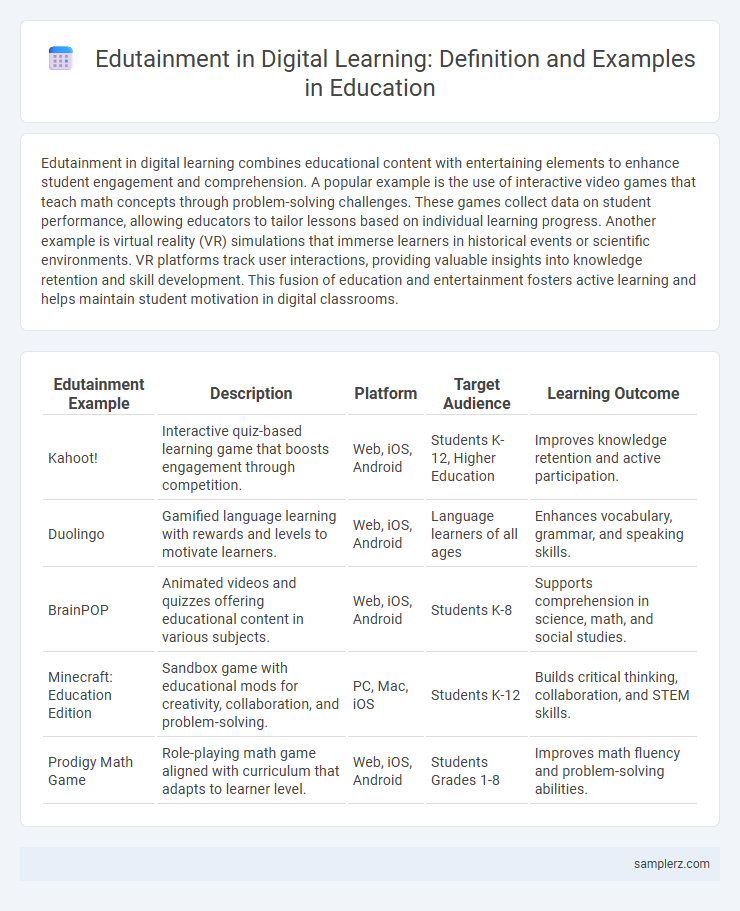Edutainment in digital learning combines educational content with entertaining elements to enhance student engagement and comprehension. A popular example is the use of interactive video games that teach math concepts through problem-solving challenges. These games collect data on student performance, allowing educators to tailor lessons based on individual learning progress. Another example is virtual reality (VR) simulations that immerse learners in historical events or scientific environments. VR platforms track user interactions, providing valuable insights into knowledge retention and skill development. This fusion of education and entertainment fosters active learning and helps maintain student motivation in digital classrooms.
Table of Comparison
| Edutainment Example | Description | Platform | Target Audience | Learning Outcome |
|---|---|---|---|---|
| Kahoot! | Interactive quiz-based learning game that boosts engagement through competition. | Web, iOS, Android | Students K-12, Higher Education | Improves knowledge retention and active participation. |
| Duolingo | Gamified language learning with rewards and levels to motivate learners. | Web, iOS, Android | Language learners of all ages | Enhances vocabulary, grammar, and speaking skills. |
| BrainPOP | Animated videos and quizzes offering educational content in various subjects. | Web, iOS, Android | Students K-8 | Supports comprehension in science, math, and social studies. |
| Minecraft: Education Edition | Sandbox game with educational mods for creativity, collaboration, and problem-solving. | PC, Mac, iOS | Students K-12 | Builds critical thinking, collaboration, and STEM skills. |
| Prodigy Math Game | Role-playing math game aligned with curriculum that adapts to learner level. | Web, iOS, Android | Students Grades 1-8 | Improves math fluency and problem-solving abilities. |
Interactive Educational Games as Edutainment
Interactive educational games combine engaging gameplay with curriculum-based content, enhancing student motivation and retention in digital learning environments. Titles like Kahoot! and BrainPOP leverage quizzes, puzzles, and simulations to develop critical thinking and problem-solving skills while maintaining fun. These games utilize adaptive feedback and real-time assessment analytics to personalize learning experiences and measure educational outcomes effectively.
Virtual Reality Field Trips in Digital Classrooms
Virtual Reality Field Trips in digital classrooms create immersive learning experiences by transporting students to historical sites, natural ecosystems, and scientific laboratories without leaving their seats. This edutainment approach enhances engagement and retention by combining interactive 3D environments with curriculum content, promoting experiential learning. Schools integrating VR technology report improved student motivation and deeper comprehension of complex subjects such as geography, biology, and history.
Gamified Learning Platforms for Student Engagement
Gamified learning platforms like Kahoot and Duolingo leverage game mechanics to boost student motivation and engagement in digital education. These platforms incorporate point systems, badges, and leaderboards, which enhance interactive learning and knowledge retention. By transforming traditional lessons into dynamic challenges, they foster a stimulating environment that encourages active participation and improves educational outcomes.
Animated Educational Videos for Concept Mastery
Animated educational videos enhance digital learning by combining visual storytelling with interactive elements to improve concept mastery, especially in subjects like science and mathematics. These videos utilize dynamic graphics, relatable characters, and real-world scenarios to simplify complex ideas, making them more engaging and easier to understand. Studies show that students retain 60% more information when learning with animated content compared to traditional text-based methods.
AI-Powered Storytelling in Digital Courses
AI-powered storytelling in digital courses transforms traditional learning by creating immersive narratives that adapt to individual student responses, enhancing engagement and comprehension. Platforms like DreamBox and Querium leverage artificial intelligence to tailor story-driven lessons in real-time, promoting deeper understanding of complex subjects such as math and science. This approach combines gamification with adaptive technology, making education more interactive and personalized for diverse learning styles.
Simulation-Based Science Experiments Online
Simulation-based science experiments online offer immersive, interactive learning experiences that enhance conceptual understanding and critical thinking skills in students. Platforms like PhET Interactive Simulations provide virtual labs where learners can manipulate variables and observe real-time scientific phenomena safely and affordably. These digital tools increase engagement, foster inquiry-based learning, and accommodate diverse learning styles in STEM education.
Educational Podcasts for Flexible Learning
Educational podcasts offer a flexible learning experience by delivering subject matter experts' insights and curriculum-aligned content to learners anytime and anywhere. Platforms like Spotify and Apple Podcasts host thousands of educational series covering topics from history to science, fostering engagement through storytelling and expert interviews. This edutainment method enhances retention by combining auditory learning with entertainment, making complex concepts accessible and enjoyable.
Social Media Challenges to Reinforce Lessons
Social media challenges in digital learning engage students by transforming educational content into interactive, viral activities that reinforce lesson objectives. Platforms like TikTok and Instagram host challenges where students create videos demonstrating math problems, science experiments, or historical reenactments, enhancing retention through social interaction. This edutainment approach leverages user-generated content and peer participation to boost motivation and deepen understanding of academic concepts.
Mobile Learning Apps with Edutainment Features
Mobile learning apps with edutainment features integrate interactive quizzes, gamified challenges, and multimedia content to enhance student engagement and retention. Platforms like Duolingo use reward systems and immersive storytelling to make language learning enjoyable and effective. These apps leverage real-time feedback and adaptive learning paths to personalize education while maintaining entertainment value.
Augmented Reality Experiences for Subject Exploration
Augmented Reality (AR) experiences in digital learning enhance subject exploration by overlaying interactive 3D models, enabling students to visualize complex concepts such as human anatomy or molecular structures. These immersive AR tools foster deeper engagement and improve retention by allowing learners to actively manipulate and explore educational content in real-time. Platforms like Merge Cube and Google Expeditions provide accessible AR environments that transform traditional lessons into dynamic, experiential learning opportunities.

example of edutainment in digital learning Infographic
 samplerz.com
samplerz.com